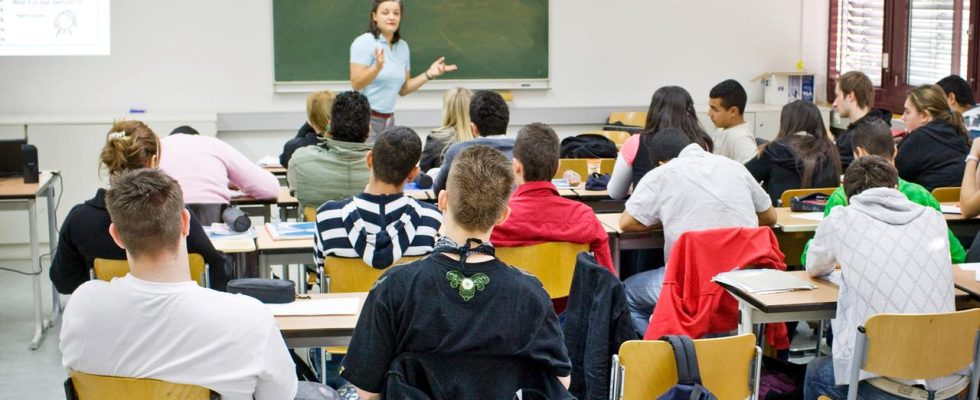German students achieved their worst result so far in the international performance comparison PISA in 2022. Academic skills also declined in most other OECD countries.
Young people in Germany are doing significantly worse in mathematics, reading and science than in 2018. This shows new PISA studywhich was introduced today.
Overall, the average skills of young people in the three areas have decreased in many OECD countries compared to the previous study from 2018. However, the performance losses in Germany are above average.
Only a few countries improved
Very few OECD countries were able to improve parts of their results between 2018 and 2022, for example Japan in reading and science and Italy, Ireland and Latvia in science.
On average, young people in Japan and Korea have the highest skills in mathematics. Ireland, Japan, Korea and Estonia are at the top in reading. In the natural sciences, Japan, Korea, Estonia and Canada achieve the best values.
What is the PISA study?
PISA – the abbreviation stands for the world’s most important school comparison test, the “Program for International Student Assessment”. The skills of 15-year-old young people in reading, mathematics and natural sciences are recorded. Since 2000 it has been carried out every three years. This time the focus was on mathematical skills.
The current study, coordinated by the Organization for Economic Cooperation and Development (OECD) and led in Germany by the Center for International Comparative Education Studies (ZIB), was carried out in spring 2022. The test lasts approximately two hours and consists primarily of multiple-choice questions, which are usually answered on a computer.
Around 6,100 representatively selected students were tested at around 260 schools of all types in Germany. The young people were also asked about their learning conditions and attitudes as well as their social background. School principals, teachers and parents answered questions about classroom design and resources as well as the role of learning in the family. Around 690,000 students worldwide took part in the study.
Only average in math and reading
After the first study in 2000, Germany was initially able to improve its results and maintain them at a high level. However, there were signs of a downward trend in the previous rounds of PISA.
Germany is only significantly above the OECD average in the natural sciences (492 to 485 points). In mathematics (475 to 472 points) and reading (480 to 476 points), results are now in line with the OECD average, which has also fallen in both areas.
Proportion of particularly low performers greater
Almost a third of 15-year-olds only have these very limited skills in at least one of the three fields tested. Approximately one in six young people has significant deficits in all three areas. The proportion of these particularly low-performing young people has increased since 2018 and amounts to around 30 percent in mathematics, around 26 percent in reading and around 23 percent in natural sciences.
The proportion of particularly high-performing students has fallen again – to almost nine percent in mathematics and to almost eight percent in reading. In the natural sciences, this proportion remained stable at around ten percent.
Notes on reasons
According to the study, indications of possible reasons for the worsened results can be derived from the surveys. On the one hand, the authors assume that the school closures during the Corona pandemic had a negative effect on the acquisition of skills. Distance learning in Germany used digital media less than the OECD average. However, the analysis of the international data shows that there is no systematic connection between the duration of school closures and the decline in performance.
According to the authors, a second factor explaining the results in the mathematics major could be the connection between the young people’s skills and the socioeconomic status of the families as well as their immigration background. This is still very pronounced in Germany. However, the mathematical skills of young people without an immigrant background have also decreased compared to 2012.
In order to explain the long-term negative trend, the researchers are also looking at student surveys about motivation, attitudes and lesson design. Compared to 2012, young people have less joy and interest in mathematics. On the other hand, fear of the subject has increased. In addition, 15-year-olds see less benefit from learning mathematics.
Warning of missteps Education policy
Shortly before the publication of the new results, the education economist Ludger Wößmann warned of the consequences of a failed education policy. “The education crisis is our greatest locational risk,” said the head of the ifo Center for the Economics of Education in Munich to “Wirtschaftswoche”. “How productively children and young people can later contribute to society depends largely on their educational performance.”
Also in view of the labor and skilled labor shortage, Germany cannot afford to continue the education crisis, said Wößmann. Among people with an academic degree or vocational training, two to three percent are unemployed, but among those without a qualification, 20 percent are unemployed.

